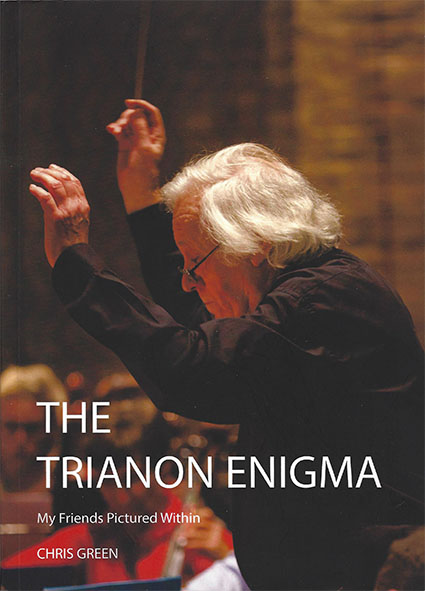- Screen Colours:
- Normal
- Black & Yellow
 The Trianon enigma, my friends pictured within, Chris Green OBE. Diatom, 2019.
The Trianon enigma, my friends pictured within, Chris Green OBE. Diatom, 2019.
Trianon are a group of amateur musicians who occasionally get together to play for the public, except they are much, much more than that simple description. Their various members have been making music since 1959 and throughout that time one of the founder members has been driving the group forward, conducting its orchestra and encouraging the choir.
That exceptional individual is Professor Christopher Green and the book The Trianon Enigma is both the history of ensemble and a potted biography of its principal conductor. What makes this book different however are the multiple interjections of memories and recollections by those who have, in a variety of different ways, contributed to the ongoing success of the group, in many cases told by people who have gone on to become renowned in their own musical field.
What becomes clear, whilst reading the book, is the infectious enthusiasm that engulfs the members of Trianon, particularly when they are rehearsing together for a forthcoming public performance.
The trials and tribulations, the ups and downs, their repeated successes and the occasional snowstorm are all included, the Trianon story is one of community involvement at all levels.
The book is full of local people, local places and local interest, together with the ever-present difficulties of trying to find a suitable rehearsal space. One would think that after sixty years that quest would be solved, but because every concert is different the requirements of the space vary according to the number of performers – whether or not the choir is to be involved – and the genre of music to be played.
The world changes and organisations that, mid-twentieth century, were only too willing to make the school hall, the village hall and the town hall available, now see these spaces as cost centres, where commercial hirers get priority use and the local community (who paid for the facility in the first place) don’t get a look in.
What I found interesting is that I, with no musical ability whatsoever, found this book very readable. Perhaps one or two of the contributors were bordering on the condescending but they were outweighed by those with an interesting anecdote, a story to retell or a footnote to add.
This book will be of interest to all who have been involved in Trianon since the beginning, but there is much within to read for anyone who has enjoyed a Trianon concert, has an interest in local arts and culture and, particularly, for the parents and grandparents of anyone who has ever performed under the direction of Chris Green.
John Norman
The book is available from the Ipswich Institute (£10.00) or by post (add £2.50 p&p) from: 01394 286928 or email: dominique.nightingale@btinternet.com